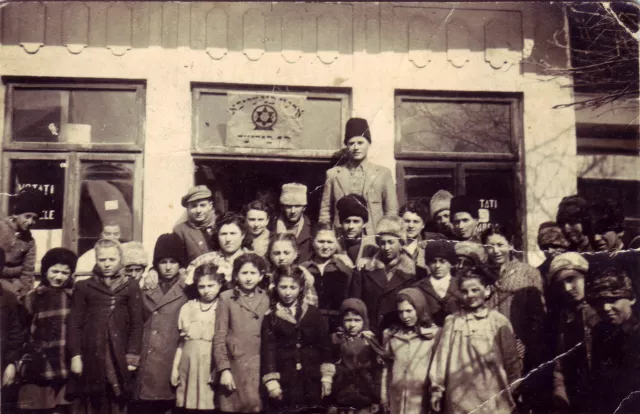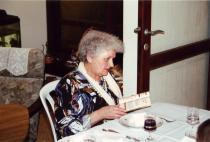This photograph was taken at the Bnei Akiva Zionist organization in Sulita. My brother, Sulim Grimberg, was a Bnei Akiva member, he is the one in the back, wearing a cap.
I had a brother, Sulim Grimberg - his Romanian name was Salo -, who was younger than me, he was born in 1927 and died in Sibiu in 1947. There were several Zionist organizations in Sulita. There was Bnei Akiva, there was Gordonia 2 as well, and others - there were all sorts of organizations. My brother was a member of Bnei Akiva. They did this and that, I don't remember what their activities were. I attended Bnei Akiva's meetings myself, but could one remember something that happened so many years ago? Everything gets depleted. Back then, in 1947, my brother left with the organization, he was 19 when he left to Sibiu. Several members of the organization went there on that occasion, for about 2 weeks. I've never been to Sibiu, but I heard others tell that there was a lake there, a sort of large marsh, and my brother and another young man from Botosani drowned in it. I have no idea how it happened. Probably they couldn't swim, and they both drowned there. The other young man was a nephew of Moisa's - his name was Moise Ciubotaru - he was the one who washed the dead. They distributed food at the Community back then as well, not only nowadays. When I settled here [when I got married], I know that he received food. They brought him from Sulita to Botosani, and he was the one who washed the dead. He too had 5 children: 3 daughters and 2 sons. All of his children left to Israel. He was an old man by then, why would he have stayed here? He and his wife applied for permission to leave, and they left to Israel. And this nephew of Moise Ciubotaru's was a friend of my brother's, they were the same age, and they both died in 1947. That's life. And afterwards, when my sister returned from Israel, she traveled to Sibiu, gave money to the Community there, and they built him a funeral monument.
This brother of mine was a rabunam. These people, who read at the altar, are called rabunam - rabbies, just as priests are for Christians. Had my brother lived, he would have become a great man in Israel. He spoke Hebrew very well, he knew the prayers well. There was a great rabbi here, in Botosani, Burstein - he was an elderly man -, he tutored my brother when we lived in Botosani. My brother always went to see him in the evening, and he studied with him, may God forgive him. And he returned home late in the evening. We had to wear the yellow star, and you weren't allowed to go out, but he went there and then returned. He wasn't afraid, he went to see that rabbi. And that rabbi, Burstein, taught my brother, he taught him all that is required.






























